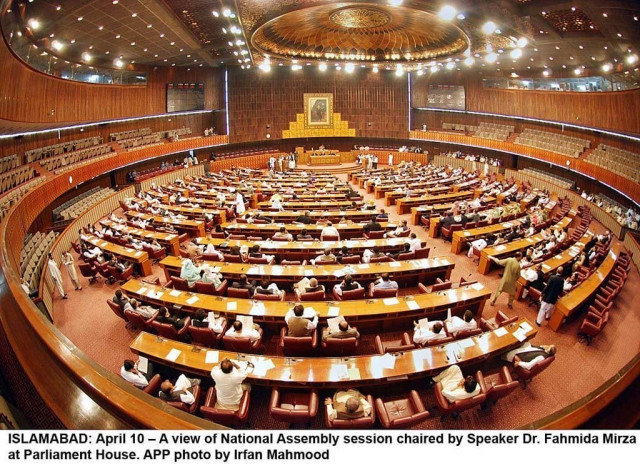NA enveloped in swirl of ‘turncoat’ allegations
Minister blames Sindh for gas crisis; Rs119.5m spent on PM’s 22 foreign visits, house told

National Assembly of Pakistan. PHOTO: APP
During the session, the PPP lawmakers accused Power Minister Omar Ayub of switching loyalties. Ayub retorted by saying that the PPP founder, the late Zulfikar Ali Bhutto, had served in the cabinet of then president Ayub Khan, the grandfather of the minister.
As the tempers flared, there were exchanges of “unparliamentary words.” Imam, who was chairing the session in the absence of Speaker Asad Qaiser and Deputy Speaker Qasim Suri, intervened to cool down both sides. He also expunged “unparliamentary words” from the proceedings.
Both sides exchanged barbs on the issue of gas shortage in the country raised by Pakistan Peoples Party (PPP) lawmakers through two calling-attention notices. Omar Ayub blamed the PPP-led Sindh government for the gas crisis.
Agha Rafih Ullah of the PPP then lashed out at the minister and said that Ayub was giving wrong information to the house. “He [Omar Ayub] has been taking different positions [in governments] by joining different parties,” he said.
Omer Ayub replied that he was elected with more than 150,000 votes. He told the PPP lawmakers that they should not taunt him as the PPP founder, the late ZA Bhutto, himself served as a minister in the cabinet of former president Field Marshal Ayub Khan before forming his own party.
On the opposition’s calling attention notices, the treasury benches also vent their anger over the ongoing crisis. Iqbal Mohammad Ali said that people could not prepare breakfast. Fahim Khan said the people of Karachi could not even burn wood, because it was not available there.
Defence Minister Pervez Khattak told the house that the oil and gas company wrote on every request about a gas project that “gas is not available”. He added: “We have told the department that you cannot do this. Gas projects in the provinces have to be completed.”
Responding to notices by Abdul Qadir Patel, Khawaja Sheraz, Power Minister Omar Ayub said that the issue of gas shortage for domestic consumers persisted because of the gap of 250 million cubic meters in supply and demand of gas.
“At present, the demand from domestic and commercial consumers and different sectors of the economy is 7 billion cubic feet and it is increasing by 7% every year, which is causing problems for consumers at the tail-end,” he said.
According to the minister, the gas consumers suffered because the previous governments ignored the oil and gas sector. “The present government has allocated 10 blocks for exploration and undertake bidding for additional 18 blocks.
He also said the Sindh government was not allowing the right of way for a gas pipeline that could ease difficulties of the consumers. “The government will give priority to the domestic consumers and we have asked the industrial sector not to draw gas from the system beyond its quota,” he said.
He said the government would establish five refineries for liquefied natural gas (LNG). “The previous governments did nothing for the storage of LNG,” he said, adding that there should be parity in the prices of LNG and natural gas. The speaker then referred the matter to the relevant committee.
Also during the Question Hour, the house was informed about the expenses incurred on the foreign tours of Prime Minister Imran Khan. The written replies, presented on behalf of the foreign minister, said that Imran made 22 official foreign visits since September 2018.
The house was informed that the prime minister used government plane for his 20 tours, while one trip was made on board a commercial flight and one via chartered flight. The reply added that 440 people accompanied the prime minister on the tours, which cost Rs119.5 million.
In another written reply, the house was informed that two Pakistani citizens were executed in Saudi Arabia in 2018 in drug cases, while 20 Pakistanis were executed in 2019 – 17 on drugs-related charges, two over murder and one for adultery.
Regarding the appointment of former military men to the ambassadorial posts, the foreign minister’s replay said 10 ambassadors were retired major-generals, while one retired vice admiral and one retired air force official served in two other countries.
The reply added that ambassadors deployed in 22 countries had the Punjab domicile, nine belonged to Sindh, eight from Khyber Pakhtunkhwa and one each from Islamabad, Balochistan and Azad Kashmir.
Aside from the exchanges on the gas crisis, the proceedings saw the treasury and the opposition benches on the same page on the legislative agenda as the members passed the Banks (Nationalisation) (Amendment) Bill, and the Pakistan Housing Foundation Employees Bill.
The government withdrew the whistle blow ordinance and presented it in the form of the Whistle-blower Protection and Vigilance Commission bill, 2019, aimed at the establishment of the a whistle-blower protection and vigilance commission.
The religious affairs minister forwarded another bill pertaining to the utilisation of the minorities properties. Speaker Asad Qaiser referred both these bills to the relevant standing committee.
Later, the members offered Fateha for former chief election commissioner Fakhruddin G Ebrahim also those martyred in Quetta blast last Friday, and the victims of rain in Balochistan and fire incidents in Karachi and Quetta.
The members from Balochistan demanded of the government to mobilise the National Disaster Management Authority (NDMA) to evacuate the people trapped in snow and rain. The session was adjourned till Tuesday (today).



1724319076-0/Untitled-design-(5)1724319076-0-208x130.webp)















COMMENTS
Comments are moderated and generally will be posted if they are on-topic and not abusive.
For more information, please see our Comments FAQ